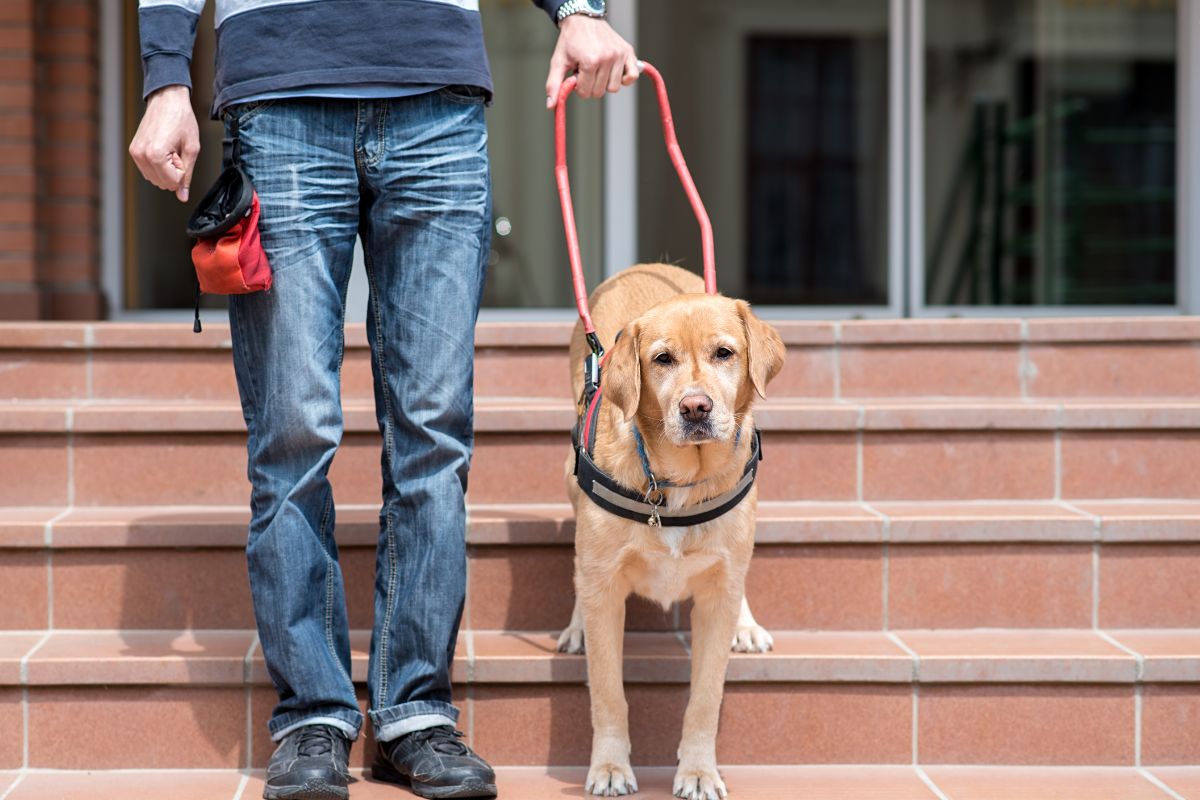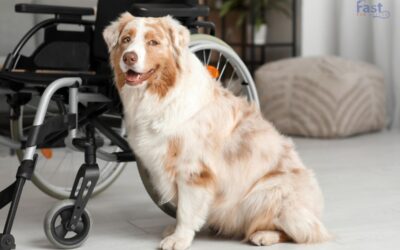How Psychiatric Service Dogs Help Manage Anxiety: A Complete Guide

Anxiety is one of the most prevalent mental health conditions worldwide, affecting millions across all age groups. This complex disorder manifests in various forms, including generalized anxiety disorder (GAD), panic disorder, and social anxiety disorder (SAD). Unfortunately, many individuals misinterpret anxiety symptoms as personal flaws, leading to untreated or worsening conditions. While professional treatment is essential, there are also effective, natural alternatives available.
One powerful alternative is the use of psychiatric service dogs for anxiety. These specially trained dogs have become invaluable companions, offering therapeutic assistance to individuals living with anxiety disorders.
In this guide, we will explore how service dogs help with anxiety, the benefits they provide, and how to get a psychiatric service dog for anxiety if you’re considering this option for your mental health support.
Key Statistics on Anxiety:
According to Statista
- 3.9% of the global population suffers from anxiety disorders.
- 6.2% of the population is affected by an anxiety disorder.
Data from the Anxiety & Depression Association of America (ADAA) highlights that:
- Generalized anxiety disorder (GAD) affects 6.8 million people or 3.1% of the U.S. population.
- Women are twice as likely to be affected by anxiety as men.
- Around 31% of all adults will experience an anxiety disorder at some point in their lives.
- Phobias are the most common type of anxiety disorder, impacting over 19.3 million U.S. adults.

What Is a Psychiatric Service Dog?
A psychiatric service dog (PSD) is specifically trained to assist individuals with mental health conditions such as anxiety, PTSD, bipolar disorder, phobias, and depression. These dogs perform tailored tasks that support their handlers in managing daily challenges, making them invaluable for coping with mental health disorders.
Under the Americans with Disabilities Act (ADA), psychiatric service dogs for anxiety can accompany their handlers in public spaces, housing facilities and benefit from legal accommodations.
How Do Psychiatric Service Dogs Help with Anxiety?
1. Therapeutic and Tactile Distraction
2. Medication Reminders
3. Easing Claustrophobia
4. Assessing and Reducing Perceived Threats
5. Early Detection of Anxiety Symptoms
6. Providing Comfort and Emotional Support
How to Qualify for a Psychiatric Service Dog for Anxiety
1. Your Anxiety Must Significantly Impact Your Daily Life
- Work or school performance
- Social interactions
- Personal care (e.g., hygiene, meal preparation)
- Mobility and independence (e.g., leaving the house, running errands)
2. The Dog Must Be Trained to Assist Specifically With Your Anxiety
What Tasks Do Psychiatric Service Dogs Perform for Anxiety Patients?
- Alerting the handler to early signs of anxiety
- Providing deep pressure therapy during panic attacks
- Creating a physical barrier in crowds or stressful situations
- Ensuring a safe environment during moments of emotional distress
- Retrieving medication during anxiety episodes
- Offering comfort and emotional support during heightened anxiety
How to Get a Psychiatric Service Dog for Anxiety
If you’re wondering how to apply for a service dog for anxiety, the process begins with obtaining a PSD letter from a licensed healthcare professional. This letter serves as an official document stating that you have a medical condition and that a psychiatric service dog can assist in managing your symptoms. With this letter, you will have the legal protection to live and travel with your PSD without facing discrimination.
To obtain a psychiatric service dog letter for anxiety, follow these steps:
- Book an Appointment with a Licensed Mental Health Professional: The first step in getting a PSD letter is scheduling an appointment with a licensed mental health professional. Many providers now offer telehealth services, so you can consult with them virtually without visiting their office.
- Consult with the Mental Health Professional: During your virtual consultation, the healthcare professional will evaluate your mental health and determine whether a psychiatric service dog can help manage your anxiety.
- Receive Your PSD Letter: If the professional confirms that you qualify for a psychiatric service dog, they will issue a PSD letter. This document will confirm your diagnosis and recommend a psychiatric service dog as part of your treatment plan.
How to Train Your Dog as a Psychiatric Service Dog for Anxiety
1. Working with a Professional Trainer
2. Getting an Already-Trained Dog
3. Self-Training
Which Dog Breeds Are Best For Service Dogs Helping With Anxiety?
When selecting a service dog for anxiety, it’s important to consider the breed’s temperament, trainability, and compatibility with your lifestyle. Here are five breeds that are often recommended as psychiatric service dogs for anxiety:
1. Golden Retriever
2. Labrador Retriever
3. Bernese Mountain Dog
4. Poodle
5. Bichon Frise
How to Choose the Right Psychiatric Service Dog for Anxiety?
Selecting the right psychiatric service dog for anxiety is crucial to effectively managing your mental health. Here are some key factors to consider when making your decision:
- Temperament: The temperament of a psychiatric service dog is one of the most important factors to evaluate. Look for a dog that is calm, patient, and resilient. Avoid breeds that are easily stressed or prone to aggressive behavior. A well-balanced dog should remain composed, even if ignored for short periods.
- Socially Active: A successful service dog for anxiety should be friendly and socially active. This trait is essential because your dog will play a significant role in lifting your spirits during difficult times. They should be approachable without being overly excitable, as excessive energy can lead to unmanageable or rough interactions with others.
- Adaptability: Your psychiatric service dog must be adaptable to various environments and situations. Whether at home, in public, or while traveling, the dog should stay calm and provide comfort. This adaptability is critical for offering consistent support, regardless of external circumstances.
- Trainability: Choose a breed known for its eagerness to learn and ability to pick up new skills quickly. Highly trainable breeds are better suited for psychiatric service dog training for anxiety. Ensure the breed you choose can learn commands and perform tasks that help manage your anxiety or other mental health conditions.
What Should I Know About Living With A Psychiatric Service Dog?
Living with a psychiatric service dog for anxiety requires a dedicated approach to maintain both the dog’s well-being and their effectiveness in providing support. Here are some tips:
- Regular Grooming: Maintain your dog’s coat according to its needs to prevent discomfort or matting.
- Daily Exercise: Provide regular physical activity like walks or playtime to keep your dog physically healthy and mentally stimulated.
- Routine Check-ups: Schedule regular veterinary visits to monitor your dog’s health and keep up with vaccinations to prevent diseases.
- Preventative Care: Ensure your dog receives heartworm and flea/tick preventative medications, as recommended by your vet.
- Emergency Preparedness: Have a plan in place that includes emergency contacts and a pet-friendly shelter in case of unforeseen events.
Bottom Line
Frequently Asked Questions
What Do Psychiatric Service Dogs Do For Anxiety?
Can A Psychiatric Service Dog Help With Panic Attacks?
How Much Does A Psychiatric Service Dog Cost For Anxiety?
Can You Get A Service Dog For Anxiety And Depression?
What Is The Difference Between Emotional Support Animals And Service Dogs For Anxiety?
Service dogs are specially trained to perform specific tasks that assist individuals with disabilities, including those related to mental health, like anxiety. In contrast, emotional support animals (ESAs) provide comfort and companionship but are not trained to perform specific tasks and do not have the same legal protections as service dogs under the ADA.
What Kind Of Service Dog Helps With Anxiety?
How Do I Get Psychiatric Service Dogs For Anxiety Near Me?
You can reach out to Fast ESA Letter, where we offer online consultations to help you through the process of obtaining a psychiatric service dog. Our team will guide you through the specific requirements and regulations for qualifying for a service dog, including the evaluation of your mental health condition.
Post Author
Prince Sharma
Related Articles
How to Get a Psychiatric Service Dog in Massachusetts?
How to Get a Psychiatric Service Dog in Massachusetts?To get a psychiatric service dog in Massachusetts, you need a recommendation from a licensed mental health professional and ensure the dog is trained to perform specific tasks related to your...
How To Get a Psychiatric Service Dog in Wisconsin?
How to Get a Psychiatric Service Dog in Wisconsin?To get a psychiatric service dog in Wisconsin, you need a diagnosis from a licensed mental health professional stating that a service dog would assist with your condition. Next, either train your dog...
How To Get A Psychiatric Service Dog in Washington?
How To Get a Psychiatric Service Dog in Washington?To get a Psychiatric Service Dog (PSD) in Washington, you must have a diagnosed mental or emotional disability that significantly impacts your daily life, and the dog must be trained to perform tasks...
Live and Fly Free with Your PSD!






